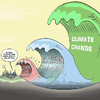Better Loosen Up
Brownlow Medallist
Does it matter how often or for what reason the Earth's climate goes through extreme changes even for a short period of time... if the end result is possibly mass and/or human extinction?
Of course it matters if you want to suggest that those extreme changes are largely caused by man or that we somehow have the ability to control all of this.
That notion is quite obviously bogus as soon as you consider that 99% of species over time have already become extinct with little to no involvement from man made climate change.






